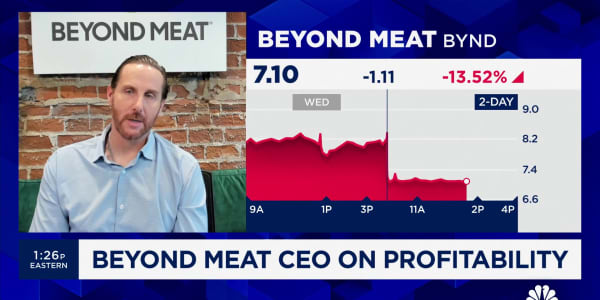
For years during the stock market recovery, the bad-news-is-good-news theme has been central, the notion being that weak data would ensure strong central bank intervention.
With the Fed now on the sidelines and, in fact, hoping to tighten policy, that truism is under heavy assault, to the point where the recent spate of bad news has been just that, with no effective relief from the U.S. central bank or any of its global counterparts.
There's been plenty of bad news as well, with a fresh batch dropped on the market Thursday.
Read More Three incredible facts about the market's horrible run
The Philadelphia Fed's manufacturing index registered a negative reading at -3.5, confirming that the sector on a national level is in a recession. Worse, the six-month forward outlook in the survey hit 19.1, its lowest point since November 2012, as did the employment component. While manufacturing is just 12 percent or so of the U.S. economy, contraction in the sector has been "very predictive of underlying turning points in the broader economy," said Joseph LaVorgna, chief U.S. economist at Deutsche Bank.
Recent optimism over the jobs outlook was tempered by a rise in weekly jobless claims to their highest level in six months. That came on top of data earlier in the week showing the economy is still not generating a healthy inflation level, some 6 ½ years after the end of the Great Recession.
Thursday's rally not withstanding, equity markets around the world are tumbling, with some major indexes in bear market territory.
Missing from the equation has been central bank intervention that either is aggressive or effective. Yes, the European Central Bank, Bank of Japan and even China's central bank have been attempting stimulus moves, but they've been largely ineffective at stemming a global lack of confidence.
Put it all together and you get a scenario where bad news is, indeed, bad news.
In fact, it's gotten so bad that Nomura reported Thursday that its financial conditions index is at -1.49 percent, the lowest reading since November 2011. A model the firm uses to predict recessions shows the probability has risen from 15 percent last week to 24 percent this week.
Read More 'Great shakeout' leading to big gains: Piper
"The recent tightening of financial conditions — combined with new declines in oil prices and appreciation of the dollar — has become large enough to have a notable impact on the outlook for the economy in coming quarters," Nomura said in a report for clients.
The analysis also said that consumer spending — used as the linchpin for economist expectations that the U.S. will avoid recession this year — is showing signs of slowing. The only bad-news-is-good-news scenario Nomura could muster is that the Federal Open Market Committee is unlikely now to hike rates another quarter point at its March meeting, probably waiting until June instead.
Indeed, traders are pricing in just a 30 percent chance of a rise in the funds target rate for March, with the greater likelihood that a move won't come until July or September. Looking into the future, markets strongly disagree with Fed officials' expectations for four hikes this year, with that many moves more likely not happening for three years, said Hans Mikkelsen, credit strategist at Bank of America Merrill Lynch.
Read More Traders to the Fed: Don't even think about it
"Behind the horrible start to 2016 for risky asset valuations lies a material downgrade of global growth over the long term," Mikkelsen said in a note. "Clearly the near-term concern for the markets is that U.S. and global data show elevated risk that the U.S. is about to enter a recession."
Credit markets, too, are pricing in the higher likelihood of recession than expansion. Junk yields are around 10 percent now, while spreads against Treasurys are around levels last seen in September 2011 and September 2009, according to David Rosenberg, senior economist and strategist at Gluskin Sheff.
Most Wall Street economists, however, have been working overtime to douse recession speculation.
Goldman Sachs' Elad Pashtan issued a note this week that got a lot of chatter on the Street, essentially pointing out that the stock market is not the economy. It was an interesting tack to take considering how far Fed officials — former Chairman Ben Bernanke most prominent among them — have gone to emphasize the importance of prices on assets like stocks in transmitting wealth to the broader economy.
"In light of the large drawdown (in stock market assets), a growing number of commentators have cited the tumult as evidence of a U.S. economy headed towards recession," Pashtan wrote. "Although equity sell-offs do coincide with most recessions, large sell-offs do not necessarily presage recessions."
Among his points was that the composition of stock indexes like the do not accurately mirror the composition of the $18 trillion U.S. economy, so market weakness doesn't necessarily translate into an economic downturn. Like several others Thursday, he also cited the beloved witticism that markets have predicted nine of the last five recessions.
However, the economy has been due at least a reckoning if not a recession: Companies for years have been buying growth through mergers and acquisitions (more than $5 trillion in 2015 alone) and elevating stock prices through buybacks that increased earnings per share in significant part simply by reducing shares. Sales barely grew during the period even while net profits soared.
So while some of the predictions of 2008-style gloom could be overheated, investors are likely to remain cautious until the good news is actually good news, and not central bank intervention that seems to have lost its bite.
"When leading indicators of the economy are flashing caution and market-based signals such as stock market performance are also pointing to a slowdown, investors have reason to be concerned," Deutsche's LaVorgna and others said in a note. "Ergo, our recent decision to mark down Q4 2015 and Q1 2016 GDP growth and our ongoing worry that our forecast for the rest of the year could prove too optimistic. Stay tuned."






